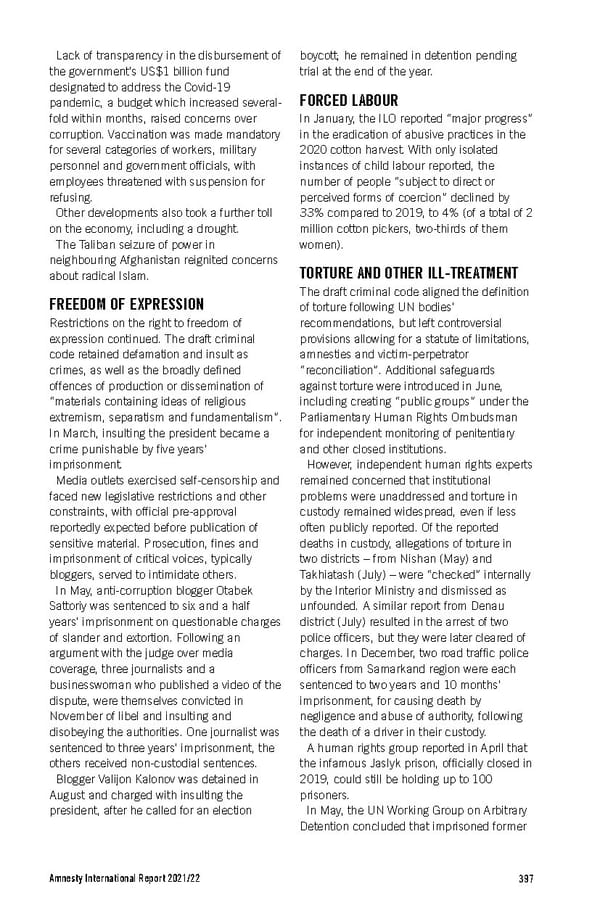Lack of transparency in the disbursement of boycott; he remained in detention pending the government’s US$1 billion fund trial at the end of the year. designated to address the Covid-19 FORCED LABOUR pandemic, a budget which increased several- fold within months, raised concerns over In January, the ILO reported “major progress” corruption. Vaccination was made mandatory in the eradication of abusive practices in the for several categories of workers, military 2020 cotton harvest. With only isolated personnel and government officials, with instances of child labour reported, the employees threatened with suspension for number of people “subject to direct or refusing. perceived forms of coercion” declined by Other developments also took a further toll 33% compared to 2019, to 4% (of a total of 2 on the economy, including a drought. million cotton pickers, two-thirds of them The Taliban seizure of power in women). neighbouring Afghanistan reignited concerns TORTURE AND OTHER ILL-TREATMENT about radical Islam. FREEDOM OF EXPRESSION The draft criminal code aligned the definition of torture following UN bodies’ Restrictions on the right to freedom of recommendations, but left controversial expression continued. The draft criminal provisions allowing for a statute of limitations, code retained defamation and insult as amnesties and victim-perpetrator crimes, as well as the broadly defined “reconciliation”. Additional safeguards offences of production or dissemination of against torture were introduced in June, “materials containing ideas of religious including creating “public groups” under the extremism, separatism and fundamentalism”. Parliamentary Human Rights Ombudsman In March, insulting the president became a for independent monitoring of penitentiary crime punishable by five years’ and other closed institutions. imprisonment. However, independent human rights experts Media outlets exercised self-censorship and remained concerned that institutional faced new legislative restrictions and other problems were unaddressed and torture in constraints, with official pre-approval custody remained widespread, even if less reportedly expected before publication of often publicly reported. Of the reported sensitive material. Prosecution, fines and deaths in custody, allegations of torture in imprisonment of critical voices, typically two districts – from Nishan (May) and bloggers, served to intimidate others. Takhiatash (July) – were “checked” internally In May, anti-corruption blogger Otabek by the Interior Ministry and dismissed as Sattoriy was sentenced to six and a half unfounded. A similar report from Denau years’ imprisonment on questionable charges district (July) resulted in the arrest of two of slander and extortion. Following an police officers, but they were later cleared of argument with the judge over media charges. In December, two road traffic police coverage, three journalists and a officers from Samarkand region were each businesswoman who published a video of the sentenced to two years and 10 months’ dispute, were themselves convicted in imprisonment, for causing death by November of libel and insulting and negligence and abuse of authority, following disobeying the authorities. One journalist was the death of a driver in their custody. sentenced to three years’ imprisonment, the A human rights group reported in April that others received non-custodial sentences. the infamous Jaslyk prison, officially closed in Blogger Valijon Kalonov was detained in 2019, could still be holding up to 100 August and charged with insulting the prisoners. president, after he called for an election In May, the UN Working Group on Arbitrary Detention concluded that imprisoned former Amnesty International Report 2021/22 397
 Amnesty International Report 2021/22 Page 396 Page 398
Amnesty International Report 2021/22 Page 396 Page 398